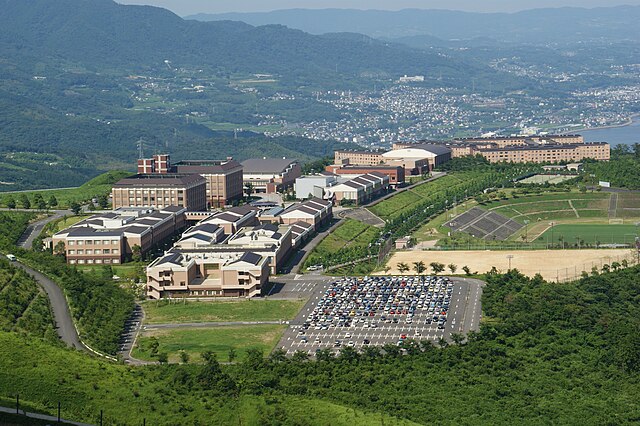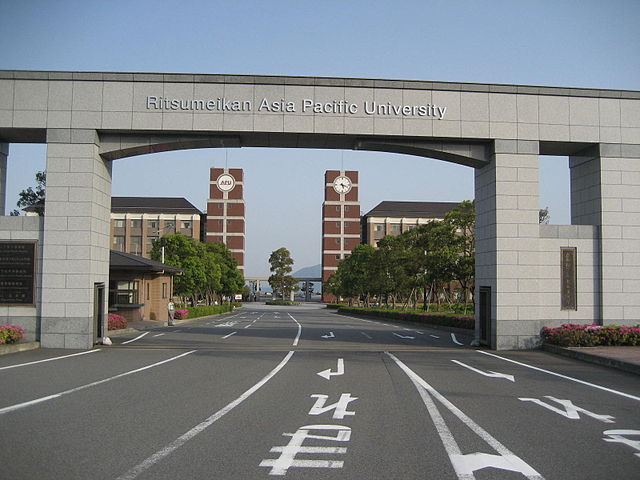The Thammasat University Faculty of Political Science Facebook page has featured a Wednesday, 17 June seminar on Politics and International Relations in Southeast Asia amid the COVID-19 Pandemic to be given at Ritsumeikan Asia Pacific University (RCAPS).
The online seminar will be conducted using the Zoom online meeting application (app).
To think about politics and international relations in Southeast Asia during the COVID-19 pandemic, TU students might consider that the TU Library owns many books about politics and international relations in the Association of Southeast Asian Nations (ASEAN) community.
The seminar will be held from 8pm to 9:30pm, Japan time, which is two hours ahead of the time in Bangkok.
RCAPS is located in Beppu, Ōita, on the island of Kyushu in southern Japan.
RCAPS, commonly referred to as APU, is one of the top international private institutions in Japan. It was established in 2000 and today has an enrollment of almost 6000, including approximately 2,900 domestic, and 2,900 international students from 90 countries and regions. Half of the 172 full-time faculty members are also foreign nationals from over 30 countries and regions.
The speakers on 17 June will be Dr. Ian J. Storey of the ISEAS Yusof Ishak Institute, Singapore; and Dr. Ying Hooi Khoo of the Department of International and Strategic Studies, University of Malaya.
The event will be moderated by Professor Yoichiro Sato of the College of Asia Pacific Studies, APU. As the RCAPS website indicates,
This webinar will discuss International security, diplomatic, and international maritime law issues in the South China Sea dispute, and domestic political issues in the current context of the coronavirus pandemic. National responses to the pandemic crisis by key Southeast Asian countries reveal both their domestic socio-economic-political contexts and foreign policy, and international security strategy involving other regional actors like ASEAN, China, and the US. Brief commentary lectures by Dr. Khoo and Dr. Storey focusing on key arguments of the pre-assigned reading will be followed by a session moderated by Professor Sato to further highlight key scholarly debates and policy questions. The final portion of the seminar will consist of a 40 minute Q&A session for engaging, interactive discussions.
TU students who are interested in attending are cordially invited to register by Sunday, June 14, 2020 at 11:59pm at this link.

Background reading
The TU Library collection also includes a number of books written and coedited by Dr. Ian J. Storey. These include The China threat: perceptions, myths and reality, which is shelved in the Boonchoo Treethong Library, Lampang campus, the Professor Direk Jayanama Library, TU Faculty of Political Science, Tha Prachan campus; and the Puey Ungphakorn Library, Rangsit campus.
Another book coedited by Dr. Storey that is in the TU Library collection is Five power defence arrangements at forty, shelved in the Pridi Banomyong Library, Tha Prachan campus.
A book written by Dr. Storety in the TU collection is Southeast Asia and the rise of China: the search for security. It is shelved in the Professor Direk Jayanama Library.
As his online biography states,
Dr. Ian Storey is a Senior Fellow at the ISEAS Yusof Ishak Institute (formerly the Institute of Southeast Asian Studies), Singapore. He specializes in Asian security issues, with a focus on Southeast Asia. At ISEAS he is the editor of the peer review academic journal Contemporary Southeast Asia. His research interests include Southeast Asia’s relations with China, the United States and Japan, maritime security in the Asia Pacific (especially the South China Sea dispute) and China’s foreign and defence policies. He has a growing interest in the Arctic and the role of Asian countries in the politics and security of the High North. Prior to joining ISEAS he held academic positions at the U.S. Defense Department’s Asia-Pacific Center for Security Studies (APCSS) in Honolulu, Hawaii and at Deakin University, Melbourne, Australia. He received his PhD from the City University of Hong Kong. Ian has published articles in Asia Policy, Asian Affairs, China Brief, Contemporary Southeast Asia, Harvard Asia Quarterly, Naval War College Review, Parameters, Terrorism Monitor and Jane’s Intelligence Review. He has published opinion pieces in The Wall Street Journal, The Straits Times and The South China Morning Post. His latest books are The Five Power Defence Arrangements at Forty (ISEAS, November 2011) and Southeast Asia and the Rise of China: The Search for Security (Routledge, 2011).
He has also recently coauthored an academic research paper, published in April 2020, on COVID-19, US-China Rivalry and Southeast Asia.
Dr. Ying Hooi Khoo has recently been elected as the Secretary-General of the Society for the Promotion of Human Rights (PROHAM).
PROHAM was established by the former Human Rights Commission of Malaysia (Suhakam) and Royal Police Commission commissioners in 2011.
Last month in the Straits Times, Dr. Ying Hooi Khoo published an article, asking if the United Nations (UN) has failed to address the Covid-19 pandemic, insofar as
the extent of international or regional cooperation among countries in combating Covid-19 has remained weak, as most countries prefer to opt for unilateral actions.
For instance, closer to the region, the Declaration of the Special ASEAN Summit on Coronavirus Disease 2019 (Covid-19) is only released on 14 April 2020, more than a month after the World Health Organisation (WHO) has declared it as a pandemic on 11 March 2020.
The pandemic has led many countries to put self-interest first. Such approach triggers the concern about whether countries will retreat into unilateral strategies and move away from the multilateral strategies that has long been a key variable in facilitating cooperation between countries in the post-Covid-19.
Prior to the outbreak, China was heading toward becoming the world’s number one economic power with its initiatives such as the Belt and Road Initiative (BRI) steadily.
China’s plan was however stumbled with the pandemic but it managed to recover fast. Now, China offers help to around 120 countries and international organisations around the world with medical supplies and workers including loans.
All of this enhanced China’s position in the global world order, although uneasily for some.

Professor Yoichiro Sato received a bachelor of arts degree from Keio University, Japan, followed by a master’s degree in government and international studies at the University of South Carolina, the United States of America (USA), and a doctorate in political science at the University of Hawaii.
On his academic webpage, Professor Sato offers this message to undergraduate students:
Gaining fluency in multiple languages and possessing specialized knowledge are essential for living a meaningful life in a globalized society. While most Japanese universities fail to produce such graduates, I hope that students who come to APU will take advantage of the best educational opportunities currently available in Japan that APU offers, and grow towards the next step of their life. Message to graduate school students: The uniquely diverse cultural environment at APU offers the best learning opportunities for both academic and practical excellence. Be prepared to challenge yourself to the maximum extent and find the right mentor who can facilitate this process.
The TU Library collection includes two books co-written and coedited by Professor Sato:
Japan in a dynamic Asia: coping with the new security challenges and Japanese foreign policy in Asia and the Pacific: domestic interests, American pressure, and regional integration, both shelved in the Professor Sangvian Indaravijaya Library.

(All images courtesy of Wikimedia Commons)

